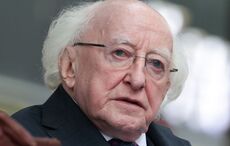Back in 1897 in New York on Passover, there occurred the kind of standoff that could only happen in this great city of ours.
It was a faceoff between an Irish policeman named Foley and two Orthodox rabbis called Klein and Weschler.
No harm was done, but the clash of the two cultures, so alien back then to each other, was a fascinating one.
It all began on Passover with a gathering at Tompkins Square Park in the city's Lower East Side to celebrate a very special occasion. Every 28 years, Orthodox Jews celebrate a unique moment when they believe that the sun slides precisely into the same position it was in when the world was created.
Back in 1897, it was only a relative handful of observant Jews who understood the moment and wanted to celebrate what they call "the new sun".
The headline from The New York Times in 1897 is instructive. It stated, "Hebrew Festival Marred."
The subhead reads, "Rabbi arrested for observance of ancient Talmudic ceremony. No permit had been thought necessary for the gathering and Policeman Foley could not understand what it meant."
Poor Policeman Foley! He was called to what he thought was a disturbance in Tompkins Square Park around the ungodly hour of 8 a.m.
There, he found people all over the park, spilling onto the sidewalks, blocking carriage traffic and generally creating mass confusion.
When Foley asked what the fuss was about, he was told they were all there celebrating "a new sun".
Foley, no doubt, looked up in the sky and saw nothing different in the solar orbit from the day before, and decided they were trying to have him on.
Like a good Irishman, he dismissed the cosmic nature of the event and instead asked bluntly if they had a permit to gather.
Nobody, of course, had thought about getting a permit for the occasion, which was the only matter of concern for Foley.
A standoff ensued. As the Times report of the day noted, "The new sun concept is a complicated matter to explain to anybody. Rabbi Klein's knowledge of English is slight, while Policeman Foley's faculties of comprehension of matters outside of police and park regulations and local events are not acute.'"
Wonderful understatement all around.
The Times noted dryly that "the attempt of a foreign citizen to explain to an American Irishman an astronomical situation and a tradition of the Talmud was a dismal failure."
When Foley was told in broken English about a "new sun," he was "doubtful whether it was an attempt to guy (fool) him," or "whether some new infection of lunacy had broken out" on the East Side.
Clearly fed up with this strange ritual, Foley decided to act. "His demonstrations became so threatening that Rabbi Klein understood that he was in danger of being arrested and clubbed, and chose the easiest and fastest plan of escape - that is, he ran away," the Times reported.
The story does not end there, however.
Another rabbi, Rabbi Weschler, with a better command of English, tried to explain matters to Foley, but with little luck.
The report says, "Both became excited, and the people who clustered around them increased the confusion."
Wechsler's English was better than Klein's, but he also could not convey the significance and purpose of the assemblage to Foley.
After some parley, Foley "seized the rabbi by the neck and took him to Essex Market Police Court."
The entire commotion attracted The New York Times and many other observers as he marched Weschler off to court with hundreds following.
An hour later it was all over. Weschler was released by a judge when it became clear he was not intent on sedition, but merely celebrating a facet of his religion.
Weschler told the Times, magnanimously, that " he felt no resentment against the policeman."
These days, of course, Weschler would hire a fleet of lawyers, talk-show hosts would discuss police brutality and poor Foley would be put on modified desk duty with severe punishment to follow.
Back then, the entire matter was cleared up to everyone's satisfaction within an hour or two.
Makes you think, doesn't it?
*Originally published April 08, 2009




Comments